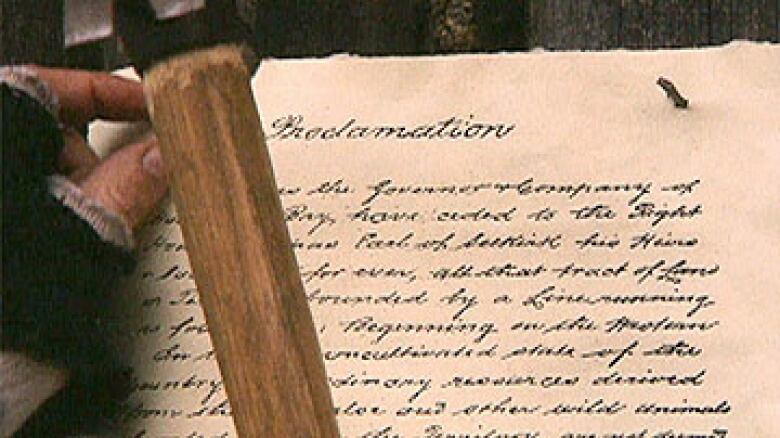Manitoba Métis mark 200 years since the Battle of Seven Oaks
Sunday is the bicentennial anniversary of the confrontation which left 21 dead

This weekend marks 200 years since the Métis flag's infinity symbol waved over Frog Plain in a confrontation that would go down in Canadian history.
On June 19, 1816 the Battle of Seven Oaks started a "spark of consciousness" for the country's Métis population, according to Will Goodon, minister of Tripartite Self-Government Negotiations at the Manitoba Metis Federation.
"This consciousness of nationalism was really sparked at that time," he said.
Leading up to the confrontation, there had been a corporate battle between the Hudson's Bay Company and the North West Company. The tensions hit a new point with the Pemmican Proclamation, which had a huge impact on the Métis populations who relied on the food for nutrition and trade.

"The Métis had been around and had been trading, had been developing the pemmican for years and generations, and then all of a sudden there were people coming from the east, coming from Europe, and putting down laws that really made no sense at the time other than to try to fill the coffers of certain fur trade companies," Goodon said, adding that there were outlying factors beyond the economic issues.
The day of the battle, Métis leader Cuthbert Grant and a group of mostly Métis people were travelling through the area to trade some pemmican. The local governor Robert Semple decided to make a stand, Goodon said, around what is now West Kildonan near Main Street and Rupertsland Boulevard.
"He was going to teach these guys a lesson. [He] came out with probably not enough force because the Métis were hunters, they were used to living on the plain, and they had their rifles ready to go," Goodon said.
"It probably wasn't the smartest move in the world on the governor's part but he decided he was going to try and teach them a lesson. Obviously that backfired on him."
In only a few minutes, 21 people were killed including Governor Semple.
"We feel that what happened at the Battle of Seven Oakes, what I've been calling a spark, a consciousness of who the Métis people are," Goodon said. "It was one of the first times that we flew the infinity flag as a national symbol, 200 years ago. It's one of the oldest flags in North America."
Following the battle, there was debate about accountability and attempts to prosecute several members of Grant's group for murder. But in 1818 the Coltman Report exonerated the Métis people. The document is on loan to the Canadian Museum for Human Rights until June 23.

"In terms of understanding of our history together, I think what followed was amazing in many ways," said Reverend Paul Johnson, dean of Rupert's Land and rector of St. John's Anglican Cathedral. "I believe [it] helped develop Canada as it is now, in the best sense of what Canada is and is on the way to becoming — multicultural, multi lingual society."
St. John's Cathedral will be marking the anniversary with a healing and reconciliation event, with a feast sponsored by the North West Company. It takes place at St. John's Park on Sunday at 5 p.m.
The Manitoba Métis Federation and Métis National council are hosting a bicentennial commemoration for Grant, the battle, and the Métis Nation flag on Sunday as well. It will begin with a service at St. Francois Xavier Church at 9 a.m. followed by tours at Grant's Old Mill Museum at 11 a.m. There will also be a special ceremony and music starting at 1:30 p.m. at the Battle of Seven Oaks National Historic Site at the intersection of Main Street and Rupert's Land Boulevard.
With files from CBC Manitoba Weekend Morning Show